|
|
|
Sort Order |
|
|
|
Items / Page
|
|
|
|
|
|
|
| Srl | Item |
| 1 |
ID:
185621
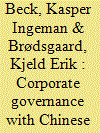

|
|
|
|
|
| Summary/Abstract |
This article analyses the role of the Chinese Communist Party (CCP) in the corporate governance of Chinese state-owned enterprises (SOEs), including a case study of a central-level SOE holding group. Relying on official documents, secondary literature and interviews with enterprise managers, government officials and academics, the article documents how the CCP has actively formalized its role in Chinese business by embedding itself in the corporate governance structure of SOEs. Through the application of Chinese indigenous administrative corporate governance concepts such as “bidirectional entry, cross appointment” and “three majors, one big,” the CCP has consolidated its dominance of enterprise decision-making procedures and personnel appointment and created a hybrid, Party-led model of corporate governance. While this hybrid model can secure enterprise compliance, communication with higher state and Party organs, as well as long-term development planning, it is unlikely to help solve SOE efficiency problems and may even undermine other SOE reforms.
|
|
|
|
|
|
|
|
|
|
|
|
|
|
|
|
| 2 |
ID:
185622
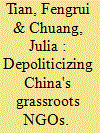

|
|
|
|
|
| Summary/Abstract |
This article employs ethnographic fieldwork and interviews to examine two distinct processes of depoliticization by non-governmental organizations advocating rights for sex workers in China. Drawing upon Bourdieu and institutional theory, we argue that the consolidation of state repression of civil society under the Xi regime created an institutional field of power to which two NGOs responded differently. While one of them relied on government procurement as its major funding source, thus diluting the original mission, the other internalized state rhetoric as it sought political legitimacy through state certification, thus sanitizing its political mission. These distinct responses were then institutionalized into organizational practices, norms and culture. Rather than portraying NGOs in China as either capable political actors or pawns of an authoritarian state, this article illustrates how NGOs are subtly depoliticized by being inculcated in a state-produced, hierarchical social order in which compliance with state norms becomes synonymous with organizational competence.
|
|
|
|
|
|
|
|
|
|
|
|
|
|
|
|
| 3 |
ID:
185615


|
|
|
|
|
| Summary/Abstract |
This article highlights the centrality of family and gender in Chinese factories in Africa through a case study of Chinese garment production in Newcastle, South Africa. The data used in the article were collected through field research in 2015 and 2016 and several follow-up interviews in 2020 and 2021. The study presents a twofold argument. First, Chinese garment firms in Newcastle can be characterized as “translocal” family firms. Unlike Chinese state enterprises and large transnational companies, these translocal family firms represent a particular kind of private capital that prioritizes a diversified source of income and that is economically embedded but less concessionary to labour pressures. Second, the racial and class encounters between Chinese employers and African women workers are constructed and contested through gender. While Chinese employers attempt to impose racial hierarchy and increase production, Zulu women workers respond to managerial control and demands in creative and gendered ways.
|
|
|
|
|
|
|
|
|
|
|
|
|
|
|
|
| 4 |
ID:
185614
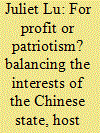

|
|
|
|
|
| Summary/Abstract |
Chinese state firms are expected not only to profit but also to serve state interests. But the Chinese state is fragmented: border provinces are taking on an expanded role in China's global expansion and a broad range of firm activities could be defined as patriotic contributions. Through the case of Yunnan State Farms (YSF), a province-level state-owned enterprise, this article explores how state firms interpret and navigate multiple state interests while also pursuing profit. The firm's ability to profit depends on balancing the demands and support of different Chinese state actors while depicting itself as a development partner to the Lao state and a contributor to Sino-Lao diplomatic relations and border region stability. This case thus shows that, instead of YSF's behaviour being directed by the state, the firm exercises considerable latitude in defining its contributions to state interests through the expansion of rubber production as a driver of development.
|
|
|
|
|
|
|
|
|
|
|
|
|
|
|
|
| 5 |
ID:
185624


|
|
|
|
|
| Summary/Abstract |
The satiric skits (xiaopin) on the annual Spring Festival Gala on China Central Television (CCTV) are arguably the most popular performances in the most-watched show on the most-censored television channel in China in the reform era. Through witty satire of emerging social problems, these performances help the audience to relieve anxieties accumulated in a fast-changing society. In particular, country bumpkin characters play a crucial role in providing a platform for the populace and the state to meet, contest, negotiate and compromise. However, they suddenly disappeared after Xi Jinping took power in 2012, which, examined in the context of socialist comedy, signals a new stage of China's post-socialist condition.
|
|
|
|
|
|
|
|
|
|
|
|
|
|
|
|
| 6 |
ID:
185613
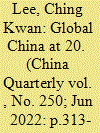

|
|
|
|
|
| Summary/Abstract |
The recent two-decade-long march of “global China” – manifested as outward flows of investment, loans, infrastructure, migrants, media, cultural programmes and international and civil society engagement – has left sweeping but variegated footprints in many parts of the world. From “going out,” officially announced in the year 2000, to the Belt and Road Initiative (BRI) and Made in China 2025, and from the developing world to advanced industrialized democracies, state-endorsed campaigns are but tips of a much more momentous iceberg. Numerous Chinese citizens and private corporations have also participated in a global search for employment, business, investment and educational and emigration opportunities. International reactions to the increasingly ubiquitous presence of China and the Chinese people in almost every corner of the world have evolved from a mixture of anxiety and hope to a more explicitly critical backlash. Terms such as “sharp power,” “debt-trap diplomacy” and the “new Cold War” bespeak the West's dominant perception today of China as a threat to be contained.
|
|
|
|
|
|
|
|
|
|
|
|
|
|
|
|
| 7 |
ID:
185617
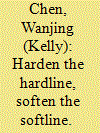

|
|
|
|
|
| Summary/Abstract |
Since the 1990s, the Chinese government has intensified efforts to control the political life of the diaspora by recruiting proxies, or qiaoling 侨领, from the extraterritorial population for community-based governance. This paper examines the efficacy of this co-optive strategy by investigating its ramifications in Lao Chinese business communities. Following a group of qiaoling in Vientiane through qualitative fieldwork, I reveal how these individuals are self-motivated to perform patriotism by the desire to earn symbolic recognition. Their fame and prestige as qiaoling are critical for their material accumulation in the often-fraudulent business of intermediation for Chinese bureaucrats and investors. As such, while contributing to realigning the political allegiance of the diaspora, qiaoling simultaneously reshape the ongoing expansion of Chinese capitalism in ways that diverge from Beijing's developmental agenda. This finding complicates the long-held imaginary of an autonomous state–diaspora synergy in post-socialist China.
|
|
|
|
|
|
|
|
|
|
|
|
|
|
|
|
| 8 |
ID:
185618
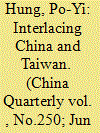

|
|
|
|
|
| Summary/Abstract |
While most ethnic Chinese in northern Thailand are Thai citizens now, their everyday lives are a site where we can witness the political power entanglement of China, Taiwan and Thailand. With this in mind, this paper aims to look into the relationship between global China and overseas Chinese from the perspective of the ethnic Chinese in the northern borderlands of Thailand. The purpose is not just to disclose the multiplicity of global China in people's everyday lives, but also to complicate the picture of overseas Chinese as portrayed in top-down grand narratives about global China. I argue that the ongoing re-Sinicization in South-East Asia and the territorial geopolitics among China, Taiwan and Thailand have opened a conceptual space for the ethnic Chinese in northern Thailand to flexibly articulate themselves within the changing geopolitical economy. I use tea production and related Chinese-language education programmes, two separate but intertwined cases, to address these issues. By looking beyond the competition, conflict and dilemmas between China and Taiwan, I argue that Taiwan's previous engagement with agricultural transfer to Thailand and the rooting of pro-Taiwan identity and discourse in language education have paradoxically paved a way for China to stretch its influence into the everyday lives of the Chinese communities in the northern Thai borderlands.
|
|
|
|
|
|
|
|
|
|
|
|
|
|
|
|
| 9 |
ID:
185620


|
|
|
|
|
| Summary/Abstract |
This paper explores China's mode of medical intervention in South Sudan and compares it with the medical humanitarianism and global health imaginaries and modes of intervention that characterize the activities of the wider international community, especially NGOs and faith-based organizations. In their provision of medical aid to South Sudan, organizations of the international community largely draw on a discourse of suffering and a framework of emergency response to humanitarian crises in post-conflict settings, which often translates into vertical programmes which involve direct governance of the South Sudanese population. In contrast, China's contemporary medical interventions in South Sudan are a mixture of health diplomacy, health infrastructure and development aid, an assemblage which can be understood as a “non-suffering” model of care and a loosely defined apparatus of biopolitics. However, the obvious gap between national goals and the daily experiences of individual Chinese doctors suggests that this will be an uneven process of “becoming.”
|
|
|
|
|
|
|
|
|
|
|
|
|
|
|
|
| 10 |
ID:
185623


|
|
|
|
|
| Summary/Abstract |
This paper uses the perspective of “state-led neoliberal modernization” to explore the collusion of the state and the market in the construction of scientific motherhood and its effect on rural nannies in China. It claims that the state and the market work together to shape rural nannies’ modern subjectivity in the neoliberal economy through the commercial training programme of scientific motherhood. Based on a case study in Shanghai, this paper argues that the training for scientific motherhood attempts to transform rural women into modern care workers through two mechanisms: reconstructing recognition and mobilizing emotion. Rather than passively receiving the training, nannies use their agency to adjust the knowledge and practice of scientific motherhood to suit their complicated working situation. Their strategies include deploying scientific knowledge flexibly and instrumentally, practising self-restraint in limited intimacy, and paying attention to their own familial investment.
|
|
|
|
|
|
|
|
|
|
|
|
|
|
|
|
| 11 |
ID:
185619


|
|
|
|
|
| Summary/Abstract |
This article examines China's most controversial soft power export – the Confucius Institute initiative – through the case study of its promotion and implementation in Ethiopia. As one of China's closest partners in Africa, Ethiopia presents a path-breaking case for examining the potential and the limitations of Confucius Institutes. In contrast to the existing literature that depicts Confucius Institutes largely as contested and limited initiatives, this article shows that Confucius Institutes and Confucius Classrooms have thus far been relatively successful in Ethiopia. Specifically, China's fusion of practical or tangible benefits with language and cultural promotion – what I describe as “pragmatic enticement” – invokes support from key participants in this project, including university administrators, students and Chinese teachers. In the long term, however, even in the highly favourable context of Ethiopia, the sustainability of Confucius Institutes is questionable, as there are apparent gaps between the rising expectations of Ethiopian administrators and students, and the limited resources on the ground.
|
|
|
|
|
|
|
|
|
|
|
|
|
|
|
|
| 12 |
ID:
185616
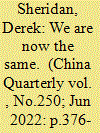

|
|
|
|
|
| Summary/Abstract |
Many accounts of Chinese migration in Africa compare China to “the West.” However, lived historical experiences, social hierarchies and moral mappings of the division of labour have mediated how different peoples in different contexts have received, interacted with and given meaning to Chinese migrants. In Dar es Salaam, Tanzania, Tanzanians talk about so-called Chinese “wamachinga” (petty traders) who have complicated long-standing ideas about “African” and “non-African” roles in the economy, and who have both opened and closed opportunities for different African traders. Based on ethnographic fieldwork in the key Tanzanian wholesale market of Kariakoo, I examine how the entry of Chinese goods and traders has been associated with shifting local economic hierarchies. I argue that debates over the presence of Chinese traders are less about “China” than about the politics of which roles belong to whom in a hierarchical division of labour.
|
|
|
|
|
|
|
|
|
|
|
|
|
|
|
|
|
|
|
|
|